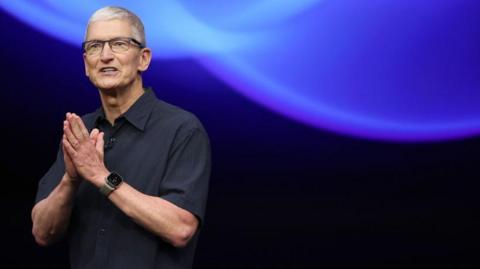Apple CEO: Diversity, Equity & Inclusion Programs May Undergo Changes
Apple CEO Tim Cook has expressed that his firm might need to adjust its diversity practices due to changes in the US legal environment. These remarks came shortly after shareholders overwhelmingly rejected a proposal urging Apple to reconsider its policies on hiring based on race and gender.
The tech giant had advised against this shareholder motion, arguing it was an “inappropriate” attempt by external parties to dictate internal business operations. The company’s actions face scrutiny amid calls from US President Donald Trump for the abolition of diversity, equity, and inclusion (DEI) programs in both government and private sectors.

Trump’s orders have faced legal challenges, yet numerous corporations including Meta, Amazon, and Goldman Sachs have already terminated or scaled back their DEI initiatives due to perceived legal risks. However, Apple’s stance on this particular shareholder proposal defied that trend by actively opposing it.
In instances where companies oppose shareholder measures, success is rare; thus, the anticipated outcome of Tuesday’s vote was realized despite initial expectations. It marked the second high-profile defeat for proposals targeting DEI policies following a similar rejection at retailer Costco.
However, in response to the vote results, Mr Cook acknowledged that Apple might need to make some adjustments as laws evolve while assuring that its core values of respect and inclusiveness remain unchanged. He clarified that Apple does not employ hiring quotas—a practice criticized heavily—instead emphasizing a corporate culture fostering collaboration among individuals with diverse backgrounds.
The shareholder proposal targeting Apple’s DEI policies was spearheaded by the National Center for Public Policy Research, a conservative think tank also responsible for similar proposals at Costco. This organization argued that such programs put Apple at risk of litigation and reputation damage, pointing to broader corporate retreats and recent lawsuits amplifying employee rights to sue over discrimination.
Stefan Padfield from the center’s Free Enterprise Project highlighted increased risks due to Trump administration directives compelling staff members to examine DEI in private sectors. “The shift is unmistakable,” he stated. “DEI initiatives are fading, while merit-based practices take precedence.”
Apple’s strategy of opposing shareholder proposals yet considering policy changes likely appeases both sides involved. Angela Jackson, a senior advisor at Harvard University’s Project on Workforce and author of the upcoming book “The Win-Win Workplace,” noted that this approach allows Apple to stay defensive.
Jackson stressed a need for Apple to strengthen its case by highlighting not only moral imperatives but also economic benefits associated with DEI programs. She suggested that Apple could achieve greater alignment between values and business performance, which is crucial in the current landscape of DEI challenges.
The debate over DEI practices in the US has prompted questions about how similar policies might fare globally. Catherine Howarth, CEO of ShareAction—a responsible investment charity—believes that Apple’s global position makes it a cautious bettor on resisting changes to its principles until recently.
“It’s unlikely that their consumer base would view abandoning these principles positively,” she observed. “Therefore, making such moves might backfire spectacularly with them.”
In addition to the DEI policy proposal, shareholders also rejected motions requiring Apple to disclose information about its AI privacy practices, charitable giving policies, and initiatives combatting child sex abuse. They supported board members backed by the company as well as executive compensation packages, including a substantial pay package for Mr Cook valued at more than $74m.
The evolving landscape of DEI policies in the US highlights ongoing tensions between corporate social responsibility and regulatory pressures, underscoring potential challenges facing similar programs internationally. Apple’s stance presents a nuanced strategy aimed at navigating these complex dynamics while maintaining its core principles.

